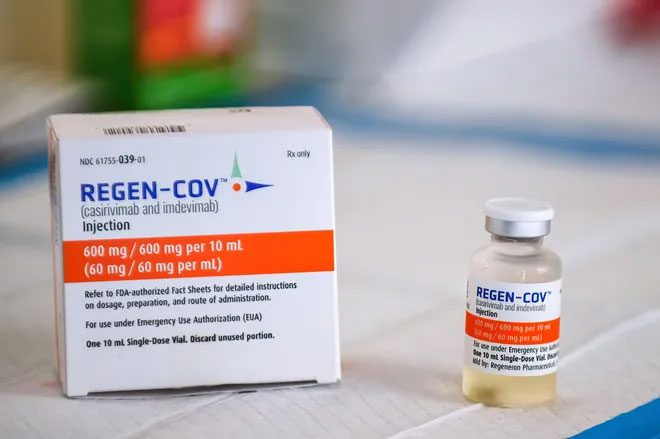According to clinical trials involving at-risk COVID-19 patients, Regen-CoV has demonstrated good tolerability, safety, and helps reduce the risk of infection and mortality.
Regen-CoV has proven effective for patients with mild to moderate COVID-19. In a study published on medRxiv on November 16, the manufacturer found that this drug also has breakthrough effects for patients with severe immunocompromised conditions when infected with COVID-19.
Immunocompromised patients, particularly those with B-cell deficiencies or those on immunosuppressive medications, are unable to produce antibodies after receiving the COVID-19 vaccine as effectively as healthy individuals. This results in a high risk of infection, severe illness, and death in these patients, even after vaccination. In the U.S., 3% of the population is immunocompromised.
The newly published study evaluates the efficacy of monthly subcutaneous doses of Regen-CoV in healthy adults who tested negative for the novel coronavirus or have chronic health conditions.
The study is in Phase 1 and involves two groups of volunteers, conducted at seven sites across the United States. One group received a placebo (235 people), while the remaining 705 received monthly doses of Regen-CoV. They were monitored and data recorded at 7-day, 24-week, and 28-week intervals.
Volunteers received up to 6 doses of Regen-CoV 1,200 mg or placebo over a 4-week period. Subsequently, the authors assessed the safety and immunogenicity of the drug.

Immunocompromised individuals receiving monthly Regen-CoV injections have protection against COVID-19 for at least 6 months. (Photo: Reuters).
This is the first study to evaluate the impact of monthly Regen-CoV injections. Results indicate that at the tested dose, the drug is safe, well-tolerated, and can prevent COVID-19 for at least 6 months.
Specifically, Regen-CoV reduces the risk of contracting COVID-19 by 92.4% in clinical trials and 100% under laboratory conditions.
The production of IgG antibodies in those receiving Regen-CoV over 6 months showed a significant decline. The seroconversion rate for anti-IgG antibodies in the placebo group was 9.6%, while in those receiving Regen-CoV it was 0%. This indicates that Regen-CoV helps immunocompromised individuals respond better to treatments and the COVID-19 vaccine.
The rate of adverse effects in those receiving the drug was higher than in the placebo group, but the difference was not substantial. The average rate of adverse effects was 36.5% across all 6 doses. The research team confirmed that this demonstrates good tolerability for the Regen-CoV doses.
With this data, the authors conclude that these results reinforce the safety, tolerability, and efficacy of monthly subcutaneous doses of Regen-CoV.
Additionally, no cases of Grade 3 hypersensitivity reactions were reported. All adverse effects were mild to moderate. The drug did not increase the incidence or severity of adverse effects following Regen-CoV injections.
Regen-CoV is a monoclonal antibody mixture used for the treatment and prevention of COVID-19 developed by the American biotechnology company Regeneron Pharmaceuticals. The formulation is based on a combination of two neutralizing monoclonal antibodies – casirivimab and imdevimab – that bind to different epitopes on the receptor-binding domain of SARS-CoV-2 (RBD), preventing the virus from entering host cells.
On October 8, the U.S. Food and Drug Administration (FDA) approved the use of Regen-CoV for adults and children aged 12 and older, weighing at least 40 kg, who are at high risk of severe illness or hospitalization due to COVID-19. This is also the first therapy approved in the U.S. as a preventive measure following COVID-19 exposure.


















































